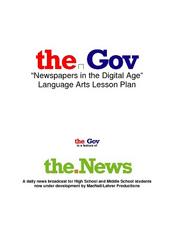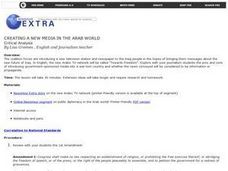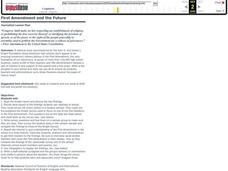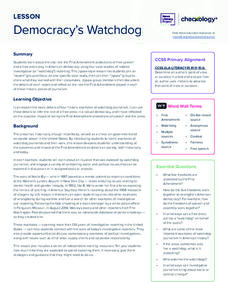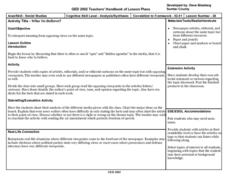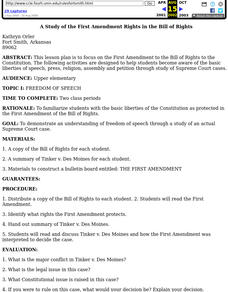Curated OER
Freedom by the Fireside: The Legacy of FDR's "Four Freedoms" Speech
Students read and analyze Franklin Delano Roosevelt's 1941 State of the Union Address. They listen to recordings of speeches by F.D.R., answer discussion questions, and participate in a debate.
Judicial Branch of California
Protecting our Freedoms: The Bill of Rights
Take to the stage! Integrate both drama and civic skills by asking pupils to create and perform skills that demonstrate the importance of the amendments in the Bill of Rights. After reviewing the Preamble to the Constitution, learners...
Curated OER
First Things First: Using the Newspaper to Teach the Freedoms of the First Amendment
Young scholars use the newspaper as a tool to make connections about what the five freedoms guarantee in the First Amendment. In this first amendment lesson plan, students analyze events in the newspaper to form conclusions about the...
Newseum
Introduction to the First Amendment: What’s a Violation?
Young historians take an in-depth look at the five freedoms granted by the First Amendment. Groups apply their knowledge of the freedoms to a series of scenarios to decide if the depicted actions represent a violation of the amendment.
Curated OER
Newspapers in the Digital Age
Is journalism more or less reliable with the influx of Internet sources? Learners investigate the issues of freedom of speech, journalistic ethics, and social responsibility in the age of Twitter and Facebook. After examining the...
Curated OER
Creating an Ethnic Student Newspaper
Students examine the role of the Black Press. In this African American history lesson, students watch segments of a video titled, " Too Long to Have Others Spoken for Us." Students respond to discussion questions regarding each of the...
Curated OER
Creating a New Media in the Arab World
Pupils explore the pros and cons of government-sponsored media into a war-torn country and determine whether the news will be considered information or propaganda.
Curated OER
First Amendment and the Future
Students read the Knight report and discuss key findings before deciding what aspects of the findings students can replicate in their own school and conduct a survey. They write survey questions and test them on sample group before...
Curated OER
Freedom from Oppression
Students investigate instances of genocide and role play as reporters writing news stories and editorials.
Curated OER
Freedom of Press or Bulletproof Vests?
Students explore the extent to which a person go for his ideals, focusing on one man's pursuit of free speech in Thailand. They, in groups, respond to five questions related to the article and based on the theme of free speech.
Heritage Foundation
Substantive Amendments: Amendments I and II
The First and Second Amendments remain some of the most famous, even to this day. Learners read about several clauses from the US Constitution through a variety of captivating activities including before and after reading, group work,...
Curated OER
Writing Newspaper Articles
Students write newspaper articles regarding their service learning experiences. In this writing skills lesson, students review the writing process skills to develop high-quality articles. Students write articles regarding the their acts...
Curated OER
The Alien and Sedition Acts: Defining American Freedom
Students analyze the Alien and Sedition Acts. In this Bill of Rights lesson, students listen to their instructor present a lecture regarding the details of the Alien Act and the Sedition Acts. Students examine Supreme Court...
PBS
The March on Washington and Its Impact
High schoolers read Martin Luther King, Jr's speech that he gave in Washington. They identify the social conditions that led to the civil rights movement. They discuss the significance of the March on Washington.
Curated OER
The First Amendment: Freedom of Expression
Students explore First Amendment rights. In this U.S. Constitution lesson, students examine the freedom of expression as they view a PowerPoint presentation and listen to the lecture that accompanies it.
News Literacy Project
Democracy’s Watchdog
As part of a study of the importance of the First Amendment, expert groups research different historic case studies of investigative reporting, and then the experts share their findings with jigsaw groups. The case studies include Nellie...
Facing History and Ourselves
Laws and the National Community
When it comes to the law, is justice always served? Teach scholars about how law sometimes enables prejudice of entire groups of people with a unit on World War II that includes a warm-up activity, analysis of primary sources,...
Curated OER
Introductory lesson for the beginning of each new year
Learners explore, analyze and discuss the human values of truth, love, peace, righteousness, and responsibility. They discover that these values help everyone live more happily and in greater harmony with other people. Valuing others...
Curated OER
Sportswriting
Students complete a variety of activities (using the Washington Post Newspaper) that reinforce concepts involved in sports writing.
Curated OER
Who To Believe?
Students interpret meaning from opposing views on the same topic, and discuss that there is often so much "spin" and "hidden agendas" in the media.
Curated OER
Children's Organization for Civil Rights
Pupils analyze a speech from Constance Baker Motley, examine student Organization for Civil Rights' documents, and then create their own plan of action for what the C.O.C.R. might be like if it existed today.
Curated OER
The Alien and Sedition Acts: Defining American Freedom
Eleventh graders explore the purpose of the Alien and Sedition Acts. In this US History lesson plan, 11th graders analyze primary source documents. Students write an essay using writing prompts.
Curated OER
Scrapbook of Freedom
Third graders create a scrapbook using personal narratives and samples of artifacts to connect to maps of geographical locations of the Underground Rail Road. they describe at least one of the feelings a child slave might have had...
Curated OER
A Study of the First Amendment Rights in the Bill of Rights
Students become aware of the basic liberties of speech, press, religion, assembly and petition through study of Supreme Court cases. Student groups analyae some cases heard by the Supreme Court to further their understanding of the First...




